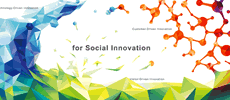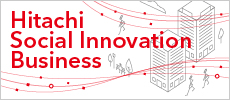Financial SystemsDigital Systems & Services
1. Shakai Sanka no Susume (“Encouraging Social Participation”) Platform—Aiming to Ensure a Sustainable Social Security
When the elderly population reaches its peak in 2040, national long-term care expenses are estimated to reach JPY25.8 trillion, more than double the current rate, leading to calls for optimization of such expenses through preventative care for senior citizens. In addition to effective initiatives in preventative care, such as proper exercise and improved diet, social participation is being advocated in recent years with growing interest.
Social participation in this context is an all-inclusive term referring to going out of the house, participating in community and hobby gatherings, and interacting with friends and others. Hitachi developed the smartphone app Shakai Sanka no Susume (“Encouraging Social Participation”) to estimate the level of social engagement and began offering it free of charge in June 2022. This app visualizes the level of social participation to promote changes in user awareness and behavior, and with the user’s consent, social participation logs are provided to local governments and private companies, realizing a platform to support the development of products, services, and environments that help with social engagement.
Use of the app among local governments and companies has already resulted in examples of social participation. Hitachi will continuously promote such activities in various industries.
[01]Data usage cycle by Encouraging Social Participation app![[01]Data usage cycle by Encouraging Social Participation app](/rev/archive/2023/r2023_02/02/image/fig_01.png)
2. Business Demonstration of Work Shift Optimization Using CMOS Annealing
With growing expectations for quantum technologies in recent years, Hitachi has recreated a pseudo-quantum computer framework and developed complementary metal-oxide semiconductor (CMOS) annealing capable of solving large-scale combinatorial optimization problems.
One usage example entails the launch of a work shift optimization service beginning in October 2021. This solution can handle complex conditions such as the required number of personnel per time slot and task, desired staff working dates, and frequency of work, etc.
In a demonstration experiment conducted with KDDI Evolva, Inc. and KDDI Corporation in July 2022, a work shift was created for a call center with nearly 100 staff members. The experiment confirmed that the system can reduce the time required by the administrator to create shifts by over 50%, with over 90% of staff giving positive responses in a post-experiment questionnaire. Because configurable conditions in many automatic shift-creation tools in this field are limited, requiring manual correction, the ability to create a shift with minimal correction that accommodates staff desires is a significant feat.
Hitachi looks forward to contributing to solving personnel allocation optimization and streamlining challenges in the future.
3. Cloud Services that Promote Sustainable Management
Achieving sustainable management requires a process of setting goals, planning and executing improvement measures, monitoring progress, and disclosing results. However, this process poses several challenges, such as collecting a wide range of data, integrating data during departmental consolidation, and managing changing disclosure items. To streamline the collection, visualization, and analysis of environment, social, governance (ESG) data and contribute to sustainable corporate growth, Hitachi launched the ESG Management Support Service in September 2022.
This service simplifies defining and recombining data by using familiar tools such as Excel* and email, making it easy and flexible for many users. Hitachi developed this service by verifying its effectiveness in the area of health and safety at Hitachi Construction Machinery Co., Ltd., which aimed to rebuild a safety culture. By automating labor-intensive error confirmation and reminders, this service successfully reduced data collection man-hours by approximately 34%. Furthermore, sharing data between departments contributed to improving safety awareness among employees.
Hitachi aims to continue improving this service to contribute to long-term corporate growth for its customers.
4. Retail DX Initiatives Using CO-URIBA, a Compact, Unmanned Store Service
CO-URIBA is a compact, unmanned store service that uses product rack- and ceiling-mounted sensors to acquire behavioral logs, provide information based on data via digital signage, and enable automatic payments through identify verification utilizing biometrics, etc. to support retail digital transformation (DX) initiatives.
CO-URIBA was installed at three Shibuya-area shops in collaboration with Tokyu Department Store Co., Ltd. for a demonstration experiment from September to November 2022. To provide an exciting new purchasing experience on a real sales floor, the service provided information and conducted questionnaires linked to social media accounts and collected advanced behavioral data such as what items customers picked up from the product rack, what they put back, and what they ended up choosing, as well as displaying product descriptions of items that were picked up on signage.
Hitachi aims to continue working toward practical retail DX applications to promote data usage for sophisticated marketing purposes and to provide more wide-ranging purchasing experiences on real sales floors.

![[02]Work shift optimization using CMOS annealing](/rev/archive/2023/r2023_02/02/image/fig_02.png)
![[03]Overview of ESG Management Support Service](/rev/archive/2023/r2023_02/02/image/fig_03.png)
![[04]CO-URIBA](/rev/archive/2023/r2023_02/02/image/fig_04.png)


